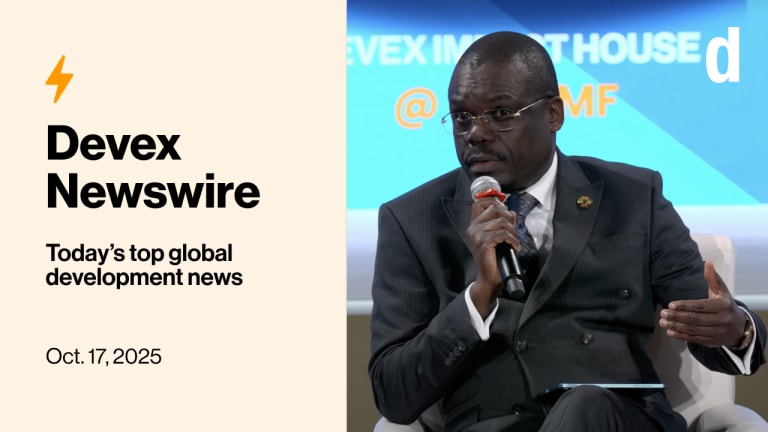Top World Bank official vows to fight for every development dollar
For nearly four decades, Axel van Trotsenburg has found ways to fund the aspirations of low- to middle-income countries.
Axel van Trotsenburg knows money. He’s spent 36 years at the World Bank working to mobilize it to help low- and middle-income countries on their development journeys. His work includes drumming up contributions for the International Development Association, or IDA, the bank’s concessional fund for the lowest-income countries. He has led and negotiated the IDA16 and IDA18 replenishment cycles, and chaired IDA20 — which mobilized a record $93 billion. Now he’s working to help make the latest cycle, IDA21, the bank’s biggest single replenishment yet. World Bank President Ajay Banga seeks a record $100 billion. “I think when you are doing this, you always have to fight. I think if you think that the money will come automatically, it’s a mistake. And it is a cause. You fight for a cause,” van Trotsenburg said at Devex World, held at Studio Theatre yesterday in Washington, D.C., on the sidelines of the World Bank-IMF annual meetings. Van Trotsenburg will have to get out his boxing gloves for this IDA replenishment, which is set to be finalized in December in South Korea. That’s because a slew of major development funds are also amid their own replenishments, meaning there’s fierce competition for scarce donor money. But van Trotsenburg said it’s not a competition. Whether it’s a health-related fund or a climate one, “they are all important because we need to make progress, and … the World Bank should not have a monopoly on this.” To the contrary, “we need to look at how we channel scarce resources through bilateral channels and multilateral channels,” said van Trotsenburg, who is senior managing director at the bank. “The advantage of a multilateral institution … is that we have an ability to leverage, so if you pay in $1, you can actually commit $10 in the middle-income countries,” he pointed out. “So there is a certain magic behind that leveraging.” “And quite frankly, we all face a challenge because there is less political support for these programs,” he added, urging everyone — from multilaterals to civil society to the private sector — to be louder about making the case for foreign aid. Van Trotsenburg is also helping to spearhead the World Bank’s “evolution road map” of reforms proposed by bank President Ajay Banga. The gist: A faster, more streamlined, more collaborative bank that’s stretched its balance sheet to increase lending across the world. While some have applauded the reforms, others say the bank is still moving too slowly and lending too little. But on Thursday, van Trotsenburg pointed out that the 80-year-old institution is capable of stepping up, citing the fast action it took in the wake of Russia’s invasion of Ukraine when it put together an economic emergency plan for the country in just 10 days. And for those who lament that the United States, as the largest shareholder, wields too much power at the bank, van Trotensburg whipped out some little-known statistics to counter that argument. He noted that when the bank was created, over 50% of the voting power was held by the U.S. and the United Kingdom. Today, the two countries have a combined 20% in voting power as they’ve ceded power to lower-income countries. “Look at any other multilateral development bank. That is not happening — in none. So that is a good sign,” he said. “If you’re looking at the entire 80-year history, I think the way to actually stay relevant is to constantly change,” he added. “All in all, how would I summarize it in a few words? It’s on the move.”
Axel van Trotsenburg knows money. He’s spent 36 years at the World Bank working to mobilize it to help low- and middle-income countries on their development journeys.
His work includes drumming up contributions for the International Development Association, or IDA, the bank’s concessional fund for the lowest-income countries. He has led and negotiated the IDA16 and IDA18 replenishment cycles, and chaired IDA20 — which mobilized a record $93 billion.
Now he’s working to help make the latest cycle, IDA21, the bank’s biggest single replenishment yet. World Bank President Ajay Banga seeks a record $100 billion.
This story is forDevex Promembers
Unlock this story now with a 15-day free trial of Devex Pro.
With a Devex Pro subscription you'll get access to deeper analysis and exclusive insights from our reporters and analysts.
Start my free trialRequest a group subscription Printing articles to share with others is a breach of our terms and conditions and copyright policy. Please use the sharing options on the left side of the article. Devex Pro members may share up to 10 articles per month using the Pro share tool ( ).
Anna Gawel is the Managing Editor of Devex. She previously worked as the managing editor of The Washington Diplomat, the flagship publication of D.C.’s diplomatic community. She’s had hundreds of articles published on world affairs, U.S. foreign policy, politics, security, trade, travel and the arts on topics ranging from the impact of State Department budget cuts to Caribbean efforts to fight climate change. She was also a broadcast producer and digital editor at WTOP News and host of the Global 360 podcast. She holds a journalism degree from the University of Maryland in College Park.








